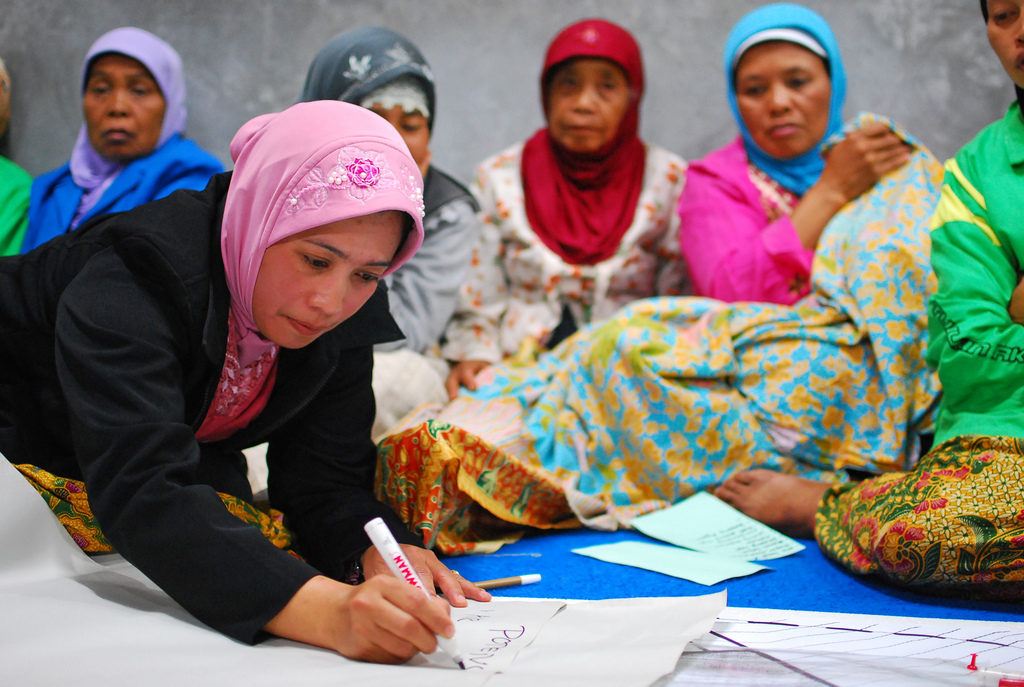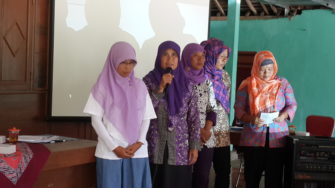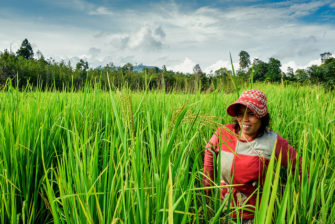
There is no sharp division between secular and religious discourse in the minds and practices of women in Indonesia. Rather, both must be used proportionately towards better public policy for women and marginal groups in Indonesian society. Religion is not only a matter of language and ritual; it is a path towards the betterment of human life. Max Weber, in his research on religious movements, questioned the religious positions controlled by religious leaders who are not models to behave with dignity (Weber 1978: 471). The Indonesian Women’s Coalition echoes Weber’s arguments and cultivates the spiritual person’s personal righteousness within the principles of Pancasila[i] through the women’s leadership program. In the coalition’s efforts to promote equality and justice, religious and secular frames and sources of authority are selectively and strategically used.
The Indonesian Women’s Coalition has trained its members to be involved in public policy making from the village to the national-level. As a mass feminist organization and movement, the Indonesian Women’s Coalition practices the principles of equality and gender justice as a correlate to the constitutionally-mandated protection of diversity (www.koalisiperempuan.or.id).
While the majority of members are Muslim, the Indonesian Women’s Coalition has organized and educated women both using religious and secular teaching. It advocates religious teachings that favor gender equality and justice, and references secular international norms. Members learn about their political and social system in the spirit of equality and critical thinking, providing new lenses with which to interpret gender relations at the family and communal levels. As a result, members have contributed to the creation of women- and children-friendly city regulations, and better reproductive health care policies.
To foster women’s leadership, the Indonesian Women’s Coalition empowers women by training them to negotiate gender relations within families. At the village level, activities involving women at the grassroots encourage dialogue processes between women and men in a family. When referring to asymmetric experiences of equality, referencing certain religious tenets can bolster the role of women outside of familial spaces and encourage the expansion of women’s leadership to serve the community. Religious authorities in Indonesia’s mosques tends to promote teachings that establish the man as the head of the family, while exclusively women are dedicated to domestic work. However, the feminist education provided by the Indonesian Women’s Coalition puts forth a rereading of the Islamic teaching that changes family relations. God created women equal to men, and as such, both should be involved with domestic tasks.
Indonesian Women’s Coalition members are also members of the PKK (the Family Welfare Development Organization) a grassroots women’s organization formed since the Suharto New Order era. During the Suharto (or officially Soeharto in Indonesia) era, the PKK was seen as a state apparatus to employ women in public service roles, but without providing women leadership opportunities. The Indonesian Women’s Coalition, built in the post-reformation era, has changed the role of women in Indonesia. Together with other women’s organizations nationwide, the Indonesian Women’s Coalition is campaigning for the implementation of a national regulation which requires political parties to nominate women to at least 30% of all candidacies. Members of the Indonesian Women’s Coalition who live in areas with local regulations that discriminate against women and marginal groups like LGBT, have worked together to remove them.

This approach has won the Indonesian Women’s Coalition the support of women around Indonesia. By the end of 2013, there were 38,000 individual members at the grassroots level in 900 villages across 24 provinces. Members of the Indonesian Women’s Coalition are mostly village-level activists, many of whom are part of women’s religious organizations, who fight together for their interests in transforming public policy. Currently through the MAMPU program (Advancing Indonesian Women for Poverty Reduction), the Indonesia Women’s Coalition assists the National Health Service by providing healthcare information at the village level. At MAMPU’s launch, the Indonesian Women’s Coalition in the region of DI.Yogyakarta held a seminar to present the national health insurance system to fellow citizens. The organizers invited religious leaders among other leaders in society to support their program on health insurance because they believe that the right to health care is political, and sought to cultivate broad support.
At the national level, the Indonesian Women’s Coalition is currently arguing cases before the Constitutional Court on the formulation of articles 284, 285, and 292 of the Code of Criminal Law (Kitab Undang Hukum Pidana). The coalition and other community organization are challenging the reformulation of the definition of adultery, which would involve the state in matters of citizens’ sexuality. Civil society organizations objected to the lack of clarity regarding the punishment for adultery outside of marriage and for same-sex sexual relations, which are seen as a crime even though they are not criminalized by national law. The current formulation of articles 284, 285, and 292 explain adultery as sexual acts committed by persons of different sexes, outside of marriage.
The Indonesian Women’s Coalition considers Pancasila, tradition, and religious discourse to be primary sources to improve the lives of women and children, as well as tools to nurture the living pluralism within its community. For examples, members educated in Islamic studies reference a teaching from the Book of Fiqh to strengthen the position of lesbian, bisexual and transgender groups both within the coalition and in society. In this book, Aisha, the wife of the prophet, protected and physically made space for transgender persons to pray behind her. As such, LGBT groups are assured protection.
Meanwhile, other members use secular discourse to advocate women’s rights within the rights framework of the United Nations, such as CEDAW (Convention on the Elimination of all Forms of Discrimination Against Women) and with the language of global feminism. These sources of authority offer international legal status which advances the coalition’s work on women rights. Both secular and religious discourse have their legitimacy and are used in different circumstances.

Arguments built by the Indonesian Women’s Coalition show respect to religious norms and international legal norms. In fact, both sources contain authoritative human rights norms which provide philosophical and religious underpinnings for their just implementation. Neither one can be relied upon on its own. The Indonesian Women’s Coalition seeks to build egalitarian social policy within state policies, and believes that individual piety, when used to improve others’ lives, can inspire more women leaders to work for equal and just public policy for all citizens.
[i] Pancasila, the foundational and constitutional theory of the Indonesian state, contains five principles of human rights values: belief in Deity, civilized humanity, unity of Indonesia, equal representation of people, and social justice
